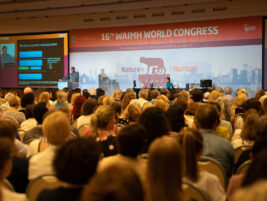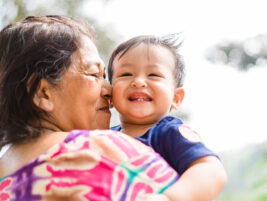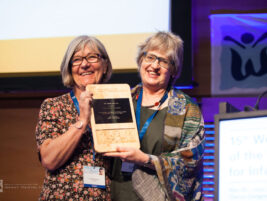In this post, the WAIMH Perspectives in Infant Mental Health editorial team would like to share two letters that have been received in response to the recently published WAIMH Perspectives in Infant Mental Health Presidential Address by our WAIMH President, Prof Dr Kai Von Klitzing: “Infants in under-staffed nurseries: In wealthy societies”.
The letters published here have been received from Kathleen Baltman (USA) and Cecilia Peduzzi (Italy). Each letter uniquely contributes to highlighting the needs of all infants and very young children within caregiving relationships with parents, foster and adoptive parents and caregivers in public and private early care and education settings.
In addition, we have also had a response to our invitation to early care and education colleagues and specialist consultants in the early care and education sector to be part of a WAIMH online special interest group to explore this issue on a global scale as a way to uphold the infant’s experience, be a voice for infants and their families, and to provide a WAIMH supported network for colleagues in this sector. There has been an expression of interest in setting this group up and this initiative will be further discussed and developed in our WAIMH Perspectives in Infant Mental Health open meeting during the Brisbane Congress in June of this year. With the use of distance technology, it should be possible to facilitate communication and action around the world with interested WAIMH members.
Letter by: Kathleen Baltman, MA, IMH-E®, Infant Mental Health Mentor, Trainer and Reflective Consultant, Michigan, USA
Dr. Kai von Klitzing, WAIMH President February 24, 2020
Dr. Maree Foley, Editor of WAIMH Perspectives
Thank you, Dr. von Klitzing and the Perspectives in Infant Mental Health editors, for your astute article, “Infants in Under-Staffed Nurseries: In Wealthy Societies,” reminding me of all that infants and toddlers ask of us and prompting my determination to redouble my responses to their needs. I especially appreciate your inviting all of us to think more deeply about babies and their needs for – and rights to – consistent responsive care in their earliest years. What appears below are some of my thoughts in response to what you have written.
Kai von Klitzing’s linking of staffing disparities in childcare settings across Germany with data on the role that differences in regional economies may be playing in the early caregiving experiences of infants, prompted additional concerns about the dire consequences of under-staffing in infant nurseries across all parts of the world. My reflections took me to my efforts of 40+ years in encouraging caregivers to recognize their importance in the developmental well-being of infants and toddlers in their centers. We can well-understand that poor working conditions, too often accompanied by minimal professional preparation, ongoing training and scant support, are quite likely to lead to their feeling unimportant in the lives of the very young, particularly those who are not yet walking or talking, or playing independently, alone or with others. It is also worthy of attention to apply a broader context to our concerns.
My reading of the summary of a recently conducted survey of foster and adoptive parents preparing to participate in an infant mental health training series on the developmental and caregiving needs of infants and toddlers,1 the results of which were similar to results from the ZERO TO THREE national Parent Survey,2 confirmed my experience that a high percentage of parents overestimate the ages by which children under the age of three achieve social-emotional competencies. For example, while foster and adoptive parents “strongly agreed that ‘an infant’s earliest relationships impact all areas of development,” more than half affirmed that “a 3-month-old permanently removed from their birth parent(s) would be less affected than would a 10-year-old, and that “infants need to cry on their own sometimes to learn how to self-regulate.” The ZTT survey results indicated that a high percentage of parents overestimated children’s self-control abilities, including abilities to resist impulses before two-to-three years of age, avoid tantrums when frustrated by or before they are one year old, and are able to share and take turns with other children before two years of age.
In accepting the principle that we cannot interpret or apply knowledge that we do not have, it seems important to consider the depth and breadth of people’s understanding and lack of understanding of children’s needs and rights, as we struggle to wrap our heads around the urgent need to change the persistent prevalence of societal failures in meeting young children’s needs for reliable care. I do believe that, when people are convinced that harm is being done to babies, action is more likely to occur. I also believe that all change occurs in the context of relationships. It is in this context that I ask all of us to carefully and respectfully consider: 1) Who is defining “needs and rights” of young children? 2) What are the relationships that can lead to and support multiple-level networks that will best carry the voices of the babies to the hearts of parents, the priorities of funders, and the intentional goals of policy makers?
Thank you, again, for giving voice to those who must depend on the strength of our voices to sound and carry the urgency of their needs.
Respectfully,
Kathleen Baltman, MA, IMH-E®
Infant Mental Health Mentor, Trainer and Reflective Consultant
Michigan, USA
1 Shea, S. E. and Riegel, A. (2018). An Assessment of Michigan’s Parent Resources for Information Development and Education (PRIDE) Training for Infant Metal Health Content: Pre-Test Evaluation Report 2018. EMU-SSW, Ypsilanti, MI.
2 Tuning In: Parents of Young Children Tell Us What They Think, Know and Need is a comprehensive research undertaking by ZERO TO THREE and the Bezos Family Foundation, 2016.
Letter by: Cecilia Peduzzi, Early Years Educator, Milano, Italy
Dear Kai,
I do thank you for the article you wrote in the last issue of “Perspectives in Infant mental Health”.
I’m an Early Years Educator. I’ve been working for 20 years with children in Milano, Niger and Mexico City (in Niger I spent 6 years, as a personal commitment for voluntary work, with no salary). I now work in public daily nurseries in the city of Milano.
Since 2017, I have been a member of the WAIMH. I thank everyone who is involved in keeping attention to child development, starting from observation of children’s needs. As an educator I just try to write the words that comes out from my daily experiences with children. I’m not good in writing but I’ll try to explain what I’ve been experiencing in the public daily care center of Milano (but also in most of the private childcare center there is the same neglect). It’s thanks to the commitment of many infant-researchers that I’ve been able to comprehend how to better care for children I found on my way.
I’ve experienced with my job how children’s needs are the same at any latitudes (as Winnicott said) and how caregiving is a universal experience that allows us to feel and become human beings, who belong to Nature; instead of human beings, who feel self-sufficient and use Nature only as an instrument of power.
“Whether we refer to attachment behavior as a useful biological function or instead we consider it as an irrelevant infant characteristic, it will depend our way of relating with our human brothers” (Bowlby, 1969, Attachment and loss, vol. 1).
Coming back to Bowlby’s words I thought about the many times I found myself working in daily nurseries where attachment behavior was considered as a whim (I think especially at the infant and toddler’s need, when he comes to the nursery, to have a key person who cares for him).
In June 2018, I wrote a letter to the Responsible of the nursery where I explained to her the emotional neglect that infants and toddlers were experiencing every day at the nursery. Their caregivers were denying them a healthy emotional presence and sensitive attunement. Infants were left crying alone, as a punishment, often in an isolated corner with caregivers threatening them with the tone of their voice and the facial expression of anger and nuisance if they dared to ask for being held in the arms of their caregiver. She answered to me that I was not a good caregiver if I was tuning to infants, giving an emotional presence, because infants need to get used to stay alone without the mental presence of an adult: it’s the space that helps the infant to develop, the caregiver just needs to be there as a theater director, who controls that the space is well organized, keeping on the sidelines.
These are the new theories, that some professors of pedagogy and sociology of Milano have invented; pure philosophical speculation, without any honest and evidence-based observation of human nature (considering human being as a part of a Nature that surrounds and holds us). In doing so, they create a human being who is self-sufficient from birth. In the opinion of the Responsibles of the public childcare center of Milano, a caregiver is competent when an infant never goes towards him to find a holding emotional presence…. we are talking about children from 3 months to 3 years old.
For this reason, average staff member to child ratio is not considered important. So, the average daily ratio is of 1 nursery educator for 8/10 infants aged 0-3. Often this ratio becomes 1 adult with over 16 infants when caregivers are not available because of illness, vacation or administrative work (when Caregivers go to the office, instead of staying with the infants, to write essays on the importance of emotional distance, that will be published on an internet page!! Leaving the colleague alone with 18 infants). Administrative work that should be done not in the hours you’re supposed to be caring for infants. But since the caregiver is not considered to give an emotional presence, she can go out of the room more easily!!
Besides this, in the same room, 24 infants are kept together, even when there’s the possibility (in the “magic moments” when many infants are absents for illness and all caregivers are present) to divide into smaller groups in order to diminish the stress felt by infants, most of the caregivers prefer to remain in the same room and be a theater director (who speaks with colleagues about the scene). Once I tried to ask my colleagues to divide into smaller group. The answer was: “infants need to learn to stay in the bigger group, without the presence of the caregiver, let them cry alone, you’re not competent”. I was amazed and I felt powerless, because I knew that that was the opinion of the Responsible of all the nurseries, and of the professors of pedagogy.
In response, I just held onto the evidence-based researchers and tried to keep my emotional presence in the best way I could…it was hard.
Only when there is an “unusual” Responsible of the center (who cares for the infants and understands the importance of the adult: child ratio in order to guarantee an emotional presence of attunement for every one) she can take the decision, that is not well seen by the Administration, of contracting the hours of the services in order to prevent emotional neglect. (Considering that unfortunately, the city of Milano allows too many families to take advantage of the extra hours, after 16h and before 9:00h even if there’s no real need (should be guarantee only when both parents working…but there’s no control).
There is a huge and dramatic raising in the number of children who develop externalized/internalized problems and also in secondary school many teens need personal support to be able to remain in the class…. but still university professors of pedagogy and sociology, (who hold the training of early years educator) don’t understand…there is a tremendous lack of evidence-based knowledges. Why?
• Why is it so difficult in 2020, aadhering to the knowledge available through scientific research and translating it into concrete instruments for those who daily work with children??
• Why has neglecting infant/toddlers (but later also children’s and adolescents) become socially accepted and is even sustained by university professors??
• Why is taking care of an infant so inconvenient in this society??
I found the same problem in Italy, as in Niger (where the same professor of pedagogy and sociology kept the control of money resources with similar kind of theories) that distract attention from essential human needs and that guarantee personal and social health. Including responsibility toward the Nature we are part of shifting it towards nonsense matter; not evidence-based!!!!
I think we are passing through a very difficult historic period, where Nature is covered by false images on internet, created by the need for power and success, and people believe the images more than Nature, but at any latitude,
Childcare is universal and can make people communicate with the language of Nature that goes beyond borders. I think J.Bowlby’s words are so true up today and help us not to lose our humanity.
I do hope that WAIMH will maintain its commitment to keep children in mind; not in Facebook, neither on internet site, and that evidence-based will remain the root that connects us with Nature….at any latitude…and that’s what we should care to spread…because caring for infants doesn’t leave space for personal interest of career, success and money. Many people, who take care of infants always give their commitment for free… with no money grant. Nature ask us to do it.
I thank you Kai for writing this article, so “politically uncorrect”; it has given me a lot of courage.
Thank you Kai.
Cecilia Peduzzi
Authors
Maree Foley (PhD) Editor-in-Chief, WAIMH Perspectives in Infant Mental Health
Letter by: Kathleen Baltman, MA, IMH-E®, Infant Mental Health Mentor, Trainer and Reflective Consultant, Michigan, USA
Letter by: Cecilia Peduzzi, Early Years Educator, Milano, Italy







